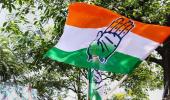‘The water crisis is so obvious that people see no point begging for it from politicians.’

‘Dausa sheher anna ka badsha, anna ghana, pani ka pyasa’ (Dausa city king of grains, crops in plenty, devoid of water).
This local saying is what people often quote when asked about the water crisis in this area. Most rely on private water tankers, and some on the ones provided by the local governing bodies. A large number of them don’t have taps at home.
And -- this is a uniform story throughout the eastern Rajasthan region.
“The water crisis is so obvious that people see no point begging for it from politicians,” said Rakesh Chaudhary, Dausa’s trade union leader.
But a project -- the Eastern Rajasthan Canal Project (ERCP) -- had kindled some hope, which, however, seems to be fading owing to the perpetual delay in notifying the project, he added.
Proposed by the BJP government (2013-18), the ERCP aims to use water from the Chambal and its tributaries to channel it in 13 eastern and south-eastern districts, which are suffering from scarcity of water for drinking and irrigation. The project will fulfil the years-long irrigation and drinking water needs of Jhalawar-Baran, Dausa, Bundi, Kota, Sawai Madhopur, Tonk, Jaipur, Ajmer, Karauli, Bharatpur, Dholpur, and Alwar.
Eastern Rajasthan has been a Congress stronghold and the party wishes to retain it. In the 2018 assembly elections, of the 84 seats in east Rajasthan, Congress got 43, the Bahujan Samaj Party (BSP) three, Independents seven, and the Rashtriya Lok Dal one. The BJP scored 29. A couple of months later all the BSP leaders returned to the fold -- the Congress.
“Murari (Murari Lal Meena is a member of Rajasthan’s legislative assembly from Dausa) is just repeating his last assembly election’s promise, now they want to protest against the Centre … making a fool out of us,” said Hariram Saini, a farmer from the nearby village in Sikrai. In our farms, monsoon is the only source of irrigation and this year’s monsoon was the worst, added Saini.
Both the Congress and the BJP have been at each other’s throats to stick the blame for delaying the project. While the Opposition has accused the ruling party (in the state) of purposefully delaying the project, the Congress has accused Prime Minister Narendra Modi of betraying Rajasthan’s people after promising to declare the ERCP a project of national importance in his previous assembly election rallies; this will essentially set the expenditure share in a 90:10 Centre-State ratio. The project’s estimated cost is around Rs 40,000 crore.
Last year Rajasthan Chief Minister Ashok Gehlot said the state would start the project’s work from its resources and had announced Rs 9,600 crore for constructing a link, a barrage, etc to be completed by 2027.
Similar is the situation in districts like Bundi and Sawai Madhopur, where people have to arrange for water tankers even though the government has installed pipelines in their homes.
Pointing out the central government’s Jal Jeevan Mission, Santosh Sharma, a resident of Bundi, said: “It is a failed mission, as some who have tap connections don’t receive water and in many areas, pipelines haven’t reached yet.”
The prime minister in 2019 had launched the mission as part of the UN Sustainable Development Goals, eyeing to provide round-the-clock water supply in every rural household.
The deadline for this mission has been shifted from 2022 to 2023, and the latest deadline is set for November this year.
According to the government’s mission portal, as of July 2023, only 41.3 per cent of Rajasthan’s rural households have been covered. This is well below the Indian average of 65 per cent.











